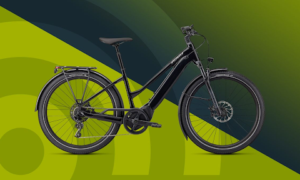In an era marked by rapid urbanisation, environmental consciousness, and evolving transportation needs, lightweight electric bikes (e-bikes) and Edge e-bikes play pivotal roles. These innovative transportation solutions address critical issues like traffic congestion, sustainability, health, and convenience, making them essential for modern urban life. This article explores their key roles and impacts across various dimensions.
Environmental Sustainability
One of the most pressing challenges today is climate change, driven by the carbon emissions of traditional vehicles. Lightweight electric bikes, including models from brands like Edge Ebikes, are heralded for their eco-friendly design. Powered by rechargeable batteries, these e-bikes produce zero direct emissions, significantly reducing the carbon footprint of urban transportation.
Energy Efficiency:
Lightweight e-bikes consume far less energy than cars or public transportation systems, making them a sustainable choice for short to medium distances.
Reduction of Air Pollution:
With cities globally grappling with air quality issues, adopting e-bikes can improve urban environments.
Urban Mobility and Traffic Decongestion
Cities worldwide are experiencing unprecedented levels of traffic congestion. Lightweight e-bikes, which are compact and manoeuvrable, offer a practical solution. Edge Ebikes, known for their innovative designs and advanced features, cater to urban commuters looking for time-efficient travel options.
Compact Design:
E-bikes take up significantly less space than cars, easing congestion on crowded streets.
Faster Commutes:
With up to 20-25 mph speeds, e-bikes enable riders to navigate traffic more efficiently, especially in densely populated areas.
Flexible Infrastructure:
Many cities are adapting their infrastructure with bike lanes, further promoting using e-bikes over traditional vehicles.
Health and Wellness Benefits
While e-bikes have a motorised component, they still require pedalling, offering a hybrid exercise experience. Lightweight models encourage more individuals to adopt cycling, promoting physical activity.
Cardiovascular Health:
Regular e-bike usage can improve heart health while less strenuous than traditional biking.
Mental Well-being:
Cycling reduces stress and improves mental clarity, making e-bikes a holistic solution for urban dwellers.
Inclusive Fitness:
Edge Ebikes and similar brands often design lightweight models with adjustable features, enabling people of various ages and fitness levels to participate.
Affordability and Cost-Effectiveness
E-bikes are an economical alternative to cars with high ownership costs, including fuel, maintenance, and insurance.
Lower Operating Costs:
Charging an e-bike battery is significantly cheaper than fueling a car or purchasing public transport tickets.
Minimal Maintenance:
Lightweight e-bikes, designed with fewer mechanical components than cars, require less maintenance, reducing costs.
Subsidies and Incentives:
Many governments offer subsidies or tax benefits for purchasing e-bikes, making them even more accessible.
Technological Advancements and Smart Features
Edge Ebikes and other leading brands integrate cutting-edge technology into their designs, enhancing user experience and safety.
Smart Connectivity:
Features like GPS tracking, app connectivity, and real-time diagnostics ensure that riders are always informed and in control.
Battery Innovation:
Lightweight electric bikes leverage advanced lithium-ion batteries, providing longer ranges and shorter charging times.
Safety Enhancements:
Integrated lights, anti-theft mechanisms, and responsive braking systems ensure rider safety in urban settings.
Sustainable Tourism
E-bikes transform the tourism industry by offering eco-friendly alternatives for exploring urban and rural landscapes.
Convenient Exploration:
Tourists can cover larger distances with minimal effort, enhancing their travel experience.
Minimal Environmental Impact:
Lightweight e-bikes reduce the ecological footprint of tourism activities, aligning with the global push for sustainable travel.
Accessibility and Inclusivity
Edge Ebikes and similar manufacturers design products that cater to a diverse user base, including individuals who may find traditional cycling challenging.
Mobility for All:
Lightweight e-bikes offer motor assistance when needed and are ideal for seniors, individuals with physical limitations, or those new to cycling.
Gender and Age Neutral:
With customisable frames and designs, e-bikes appeal to riders of all ages and genders.
Cultural Shift Towards Active Transportation
The rising popularity of lightweight e-bikes reflects a broader cultural shift towards active and sustainable transportation.
Lifestyle Choice:
E-bikes are symbols of a modern, eco-conscious lifestyle, appealing to young professionals and environmentally aware consumers.
Community Building:
The rise of e-bike communities fosters social connections and collective environmental efforts.
Future Urban Planning
Lightweight e-bikes influence urban planning strategies, encouraging cities to create infrastructure prioritising non-motorized transport.
Dedicated Bike Lanes:
Urban planners are incorporating more bike lanes to accommodate the growing number of e-bike users.
Integrated Transport Systems:
E-bikes are increasingly integrated with public transport systems, enabling seamless multimodal travel.
Economic Growth and Job Creation
The e-bike industry is a significant driver of economic growth, creating jobs and stimulating innovation.
Manufacturing and Retail:
The production and sale of lightweight e-bikes contribute to local and global economies.
Maintenance Services:
The growing demand for e-bike repair and maintenance services supports small businesses and skilled labour.
Conclusion:
These innovative transportation tools play a critical role in shaping a greener and more connected future by promoting sustainable urban mobility, reducing environmental impact, enhancing public health, and fostering economic growth. As cities and individuals increasingly adopt e-bikes, their influence will continue to grow, making them indispensable in today’s era.




































